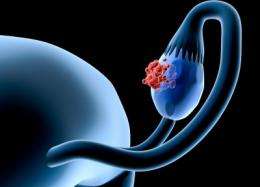New research could lead to a new approach in treating some types of ovarian tumours.
(Medical Xpress)—Scientists have identified a process associated with inflammation in cancer that they believe could lead to expanded treatment options for some types of ovarian tumours.
Led by Dr Andrew Stephens from the Prince Henry's Institute (PHI), in collaboration with Monash Health, Hasanuddin University, Indonesia and Lincoln Research Centre, Christchurch, the team have published findings in the International Journal of Cancer showing that some high-grade serous ovarian tumours modify a protein called "CXCL10" to suppress attack through normal immune responses.
"In normal circumstances, CXCL10 encourages white blood cells to attack tumour tissue. However, we found that some ovarian tumours are able to modify CXCL10 to prevent this from happening," Dr Stephens said, Ovarian Biomarkers Laboratory Head.
According to Dr Stephens, as well as highlighting a well-established link between immunity and cancer progression, this research offers an explanation as to how some ovarian tumours block the body's early anti-tumour immune responses to promote cancer growth and metastasis.
"We have known for some time that there is a link between immunity and cancer progression. This research increases our understanding of how some tumours manage to overcome the body's anti-tumour immune responses, and possibly promote their spread to other areas of the body," Dr Stephens said.
The finding could lead to a new approach in treating some types of ovarian tumours, with the team now moving to trial therapies targeting this tumour-specific modification - something Dr Stephens believes could have significant benefits for women diagnosed with these tumours.
"Our next goal is to determine whether this approach might complement existing treatments. By promoting increased immune recognition and destruction of tumour cells, we believe that combination therapies could lead to significantly better outcomes for patients," Dr Stephens said.
Journal information: International Journal of Cancer
Provided by Monash University




















